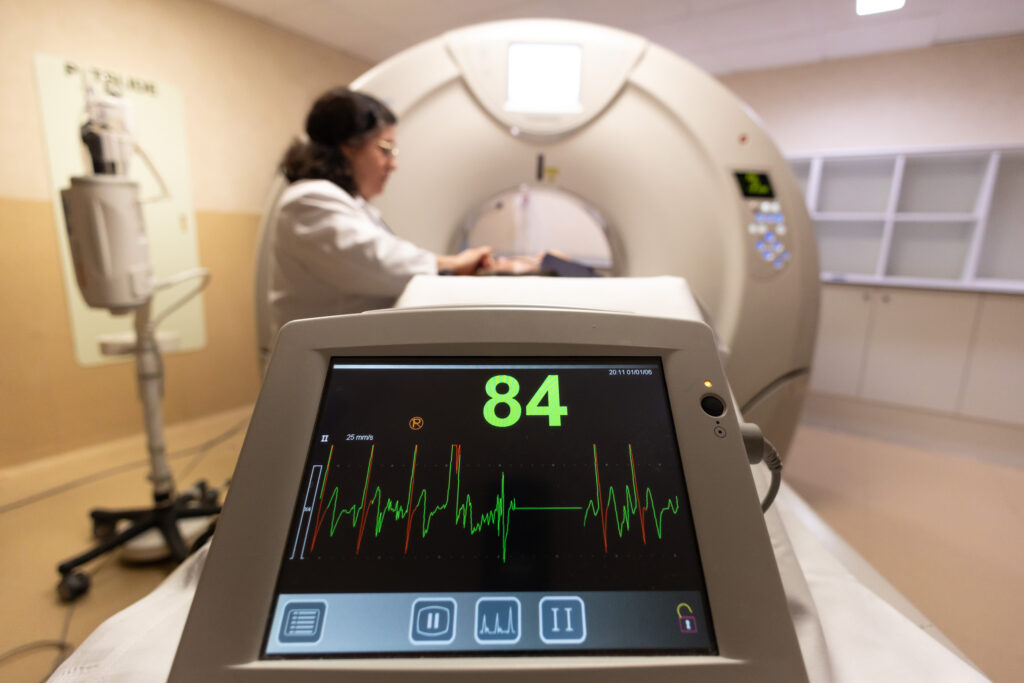Coronary CT
What is a Coronary CT?
Coronary Computed Tomography (CT) is a diagnostic imaging test that uses X-rays to create detailed images of the arteries that supply blood to the heart muscle. Unlike conventional X-rays, which provide a two-dimensional image, coronary CT uses advanced technology to obtain three-dimensional images of the heart and its blood vessels.
What is this diagnostic test for?
The main uses of coronary CT are:
- Detection of coronary artery disease: Allows for the detection of coronary artery disease due to atherosclerosis (accumulation of fats and inflammatory cells) which increases the risk of angina/myocardial infarction.
- Evaluation of obstructions and narrowings: Helps identify possible obstructions or narrowings in the coronary arteries.
- Treatment planning: Facilitates informed decision-making regarding patient treatment and management.
Benefits of High Technology in Coronary CT
Coronary CT offers a series of key benefits thanks to the technology it uses:
- Detailed images: Allows for detailed images of the heart and its blood vessels.
- Non-invasive: It is a non-invasive technique, meaning it does not require surgery or incisions.
- Fast and simple: It is a quick and simple test that generally lasts between 10 and 20 minutes.
- Accurate evaluation: Allows cardiologists to accurately analyze the state of the coronary arteries.

What does the procedure involve?
Coronary CT is a relatively simple procedure that consists of the following steps:
-
Preparation:
You will be asked to fast for 6 hours prior to the test.
-
During the test:
First, our doctors will ask you to lie on a table that slides into the CT scanner. Electrodes will be placed on your chest to monitor your heart rate and a cuff on your arm to measure your blood pressure. An intravenous line will also be placed in your arm. Provided there are no medical contraindications, you will be given a sublingual vasodilator (nitroglycerin) which has a very short action and allows for better study of the heart arteries. In some cases, it may be necessary to administer medication to slightly lower your heart rate. This is always done with monitoring and in the presence of a cardiologist. In that case, a contrast agent will be administered through the intravenous line. This helps the arteries appear more clearly in the images. During the test, you will be asked to remain calm and, at times, to hold your breath briefly.
-
After the test:
Once image acquisition is complete, the intravenous line will be removed, and you can resume your usual activities.
Recommendations for the test
Remember that it is important to follow these recommendations to ensure the quality of the study and your comfort:
- Inform your doctor: If you have allergies, especially to iodine or iodinated contrast. You should also inform if you are pregnant.
- Medications: Be sure to inform about any medications you are taking.
- Clothing: We recommend comfortable clothing and avoiding jewelry or metallic accessories that may interfere with the image.
Are there any risks?
Coronary CT is generally safe, but like any medical procedure, it has some minimal risks to consider:
- Radiation exposure: CT uses radiation, but the amount is generally low and considered safe. Your doctor will assess whether the benefits outweigh the risks.
- Reaction to contrast medium: Some people may experience allergic reactions to the contrast medium, although this is rare. In case of occurrence, a doctor is present at all times to assist you.
- Kidney problems: If you have kidney problems, it is important to discuss this with your doctor, as the contrast medium can affect kidney function.
For your test to go smoothly, we ask that you arrive in advance of your scheduled time. This will allow us to complete the necessary administrative and clinical preparation.
Before the test, we will provide you with the Informed Consent form, a document with important information that you must read and sign.
If your appointment is for a Magnetic Resonance Imaging (MRI), it is crucial that you inform us about the presence of pacemakers, metallic objects, prostheses (including dental ones), tattoos, or medication infusion devices, such as insulin pumps.